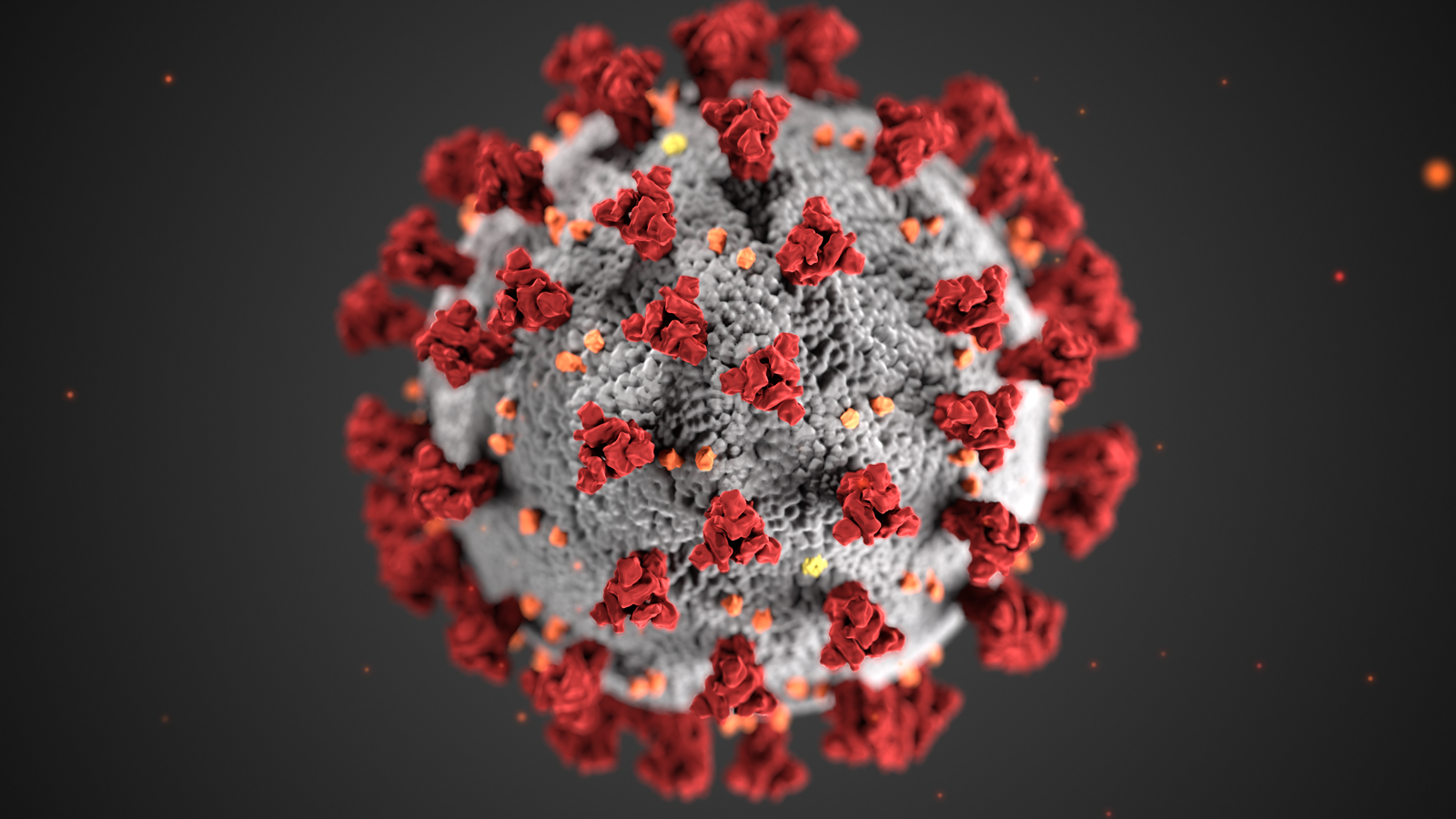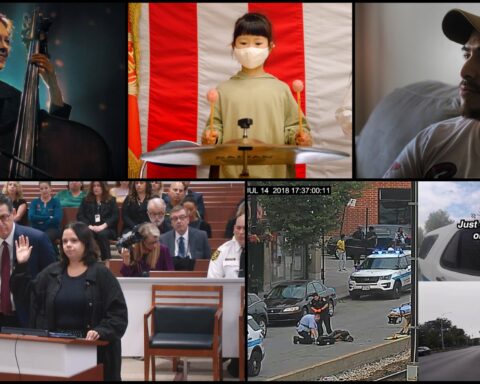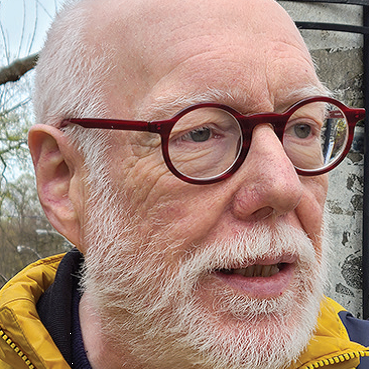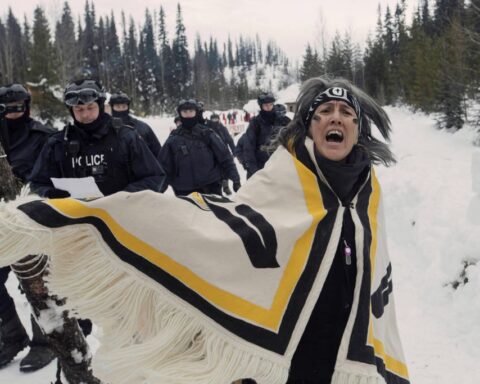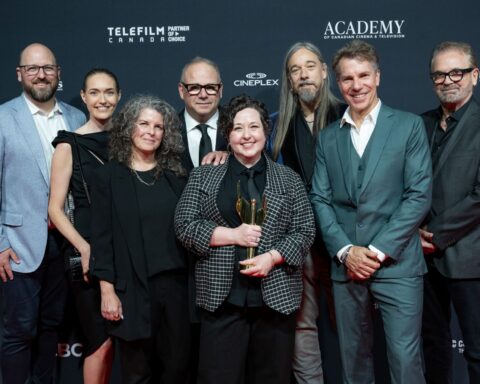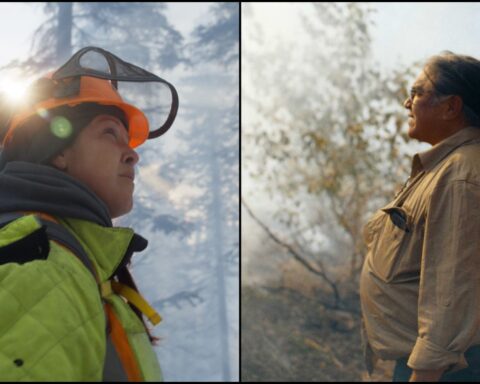Roiling between incomprehension collective and personal grief, and even boredom, many of us are likely overwhelmed by powerlessness at this historic moment. To the rescue has been a mind-numbing array of digital aids and distractions for gig economy creators, artists, and filmmakers. Much can be found in a torrent of online resources: free streaming selections from delayed or cancelled festivals, online viewing of print publications and extensions of legacy media offerings, as well as access to film and TV markets and conferences, webinars, and Zoom meetings. Look, even more money is available through CBC’s creative relief fund! Boy, do I wish Peter Wintonick were still with us. He’d likely riff on something that suggests that the CBC should always be a creative relief fund through something like the Creative Belief Corporation fund. In any case, it all points to the “help” and the collective digital hug everyone is giving each other. And that’s a good thing.
If you were set to premiere your film at a festival, though, you’ve just taken a massive hit. If you can pivot to development, that’s great, because the major funders and broadcasters have assured filmmakers in recent weeks that they are continuing to take pitches. But with many folks now on pause, the competition for such funds will likely be tougher. One wonders how fulsome development can be without the ability to shoot right now, unless funders are going to accept a raft of Zoom-based recordings!
And of course, for anyone in or about to be in production (in any capacity), the future is worryingly uncertain. What could, should, or will production look like in the short and very long term?
Unless I’m mistaken, most of the talk about the after-COVID-19 phase (or between its infection waves), has been focussed on scripted and competitive reality fronts. Playback’s April 6 roundtable discussion underscored the likely intense competition for crews and studios as all scripted production companies reset at exactly the same time. They also noted the format disruption live studio shows will undergo (until there’s widespread vaccination). Even if shooting in short spurts between infection waves is feasible, smaller, more nimble formats will be privileged (ciao, multi-cams and audiences), while scaled down digital forms of collaboration will be privileged and could well prevail past COVID-19. We’ve seen this already in very clever and inventive US-based prime-time chat and comedy shows. Even SNL got into the act on Easter weekend, giving postmodern life to the canard of “the show must go on!” with its second highest ratings in its forty-four-year history.
All of this is familiar to documentary. We are already nimble. It’s part of our DNA. There’s very little we cannot scale up or down to on a moment’s notice. Even for doc series, we can shoot in spurts and deliver in smaller batches. It’s this kind of thinking that has to happen across the board, with everyone signing on, from funders and broadcasters to crews. It requires the ongoing leverage of support the government has come to recognize is needed after all(!) for the creative community. It’s support that lays bare a hard truth long known by the nation’s creative and production associations and guilds: we’re not part of a “free market” economy.
Still, for all media leaders and creators, we can’t divine the universe of challenges ahead. We just know that we have to jump on calls and Zooms to problem solve at a moment’s notice. In this regard, the documentary community is a leader.
On March 26, the Documentary Organization of Canada (DOC) convened a massive webinar with over 400 participants Zooming in to hear from funders, stakeholders, and broadcasters to figure out where our funders set and if, how, and when we think we could or should be shooting or at least developing documentaries.
The good news is that if you are contracted to deliver a film, they’ll wait, and even alter draw downs and discuss re-scaling. As noted above, they’ll also take pitches for new projects. They could have called all things off, so there’s a collective sigh of relief. But the hard news, as noted by Bizable Media’s Kathy Avrich-Johnson, is that production insurance will not cover you if you shoot during the “civic order” to stay home. That means there should be no shooting at all if you want your shoots insured from loss, damage, theft, or any other kind of liability, until the civic order is lifted.
In my own case, I had my long-awaited feature doc, set to go into production, immediately shut down. By April, the two-week self-isolation turned into twelve weeks. My team reverse-engineered some elements of production so that, whatever we can research and prep online, including accessing significant archives, we do. Whether anyone is at their “desk,” especially Ontario Archives, however, is unlikely. And I need them. It has dawned on many of us that twelve weeks could turn into more. But if PM Trudeau only opens up “some” of the economy on July 1, what will that look like? What is “some” of the economy? Will that mean we can convene in our small crews of four and shoot with one subject, at least, at a time? And crucially, will our participant release forms need revision to contain a new Health Waiver clause, holding all parties blameless in the event of inadvertent infection? Or would we have to warrant that we are COVID-19-safe or -free? Producer Cornelia Principe queried this in a follow-up discussion to DOC’s webinar, and it’s anyone’s guess.
And lest we think we’ve woken up in a Black Mirror plot, it may indeed be the case that “immunity passports” could be the hot ticket item to resume work and assurance to others. These would require robust and widely applied antibody tests until the globe is vaccinated. It will be interesting to see how our filmmaking aesthetic will be affected by representation (inadvertent or not) of “physical distance.” Notions of safety will have to be incorporated into production days, meaning that our standard eleven-hour shoot day will have to become elastic, not just now but perhaps into an enduring future.
And what of travel? I find it difficult to imagine any crew getting in anything but a car or train come a post-COVID-19 world for some time to come. Air travel will be a major problem as it’s the key vector of the pandemic. What kind of stories will we see in the year or two to come? No doubt, a surfeit of tales will flow as we learn from filmmakers how they pivoted and scaled up, down, and sideways to keep their cameras focussed on the world.
As for digital-everything, let’s put the brakes on. It’s true many of us already research, write, collaborate, and edit remotely, but let’s not fall into this as a “new normal.” We are social creatures and evidence from cognitive science has long observed that we think better together in dialogic communities that are embodied. Disembodied togetherness can produce many good things (oh, those Zoom parties!), but solving complex problems without the micro, physical nuances of back-and-forth, empathic exchanges is likely not going to be among them. Nothing can nor should replace the physical energy of being together. It’s an atavistic need that is most human about us.
Finally, and rather ironically, before COVID-19, I had been preparing policy column on the new, generation-defining set of recommendations set to frame how the government re-writes the Broadcasting and Telecommunications Act. It included, finally, ways for foreign OTTs and digital giants, who are raking in vast “quarantine” dollars now, to pay their taxes. Perhaps in light of our industry’s exposed vulnerability, Parliament’s appreciation for who we are and what we do will inform new legislation that can stabilize and improve the entire industry and our capacity to tell stories into a hardier future.




